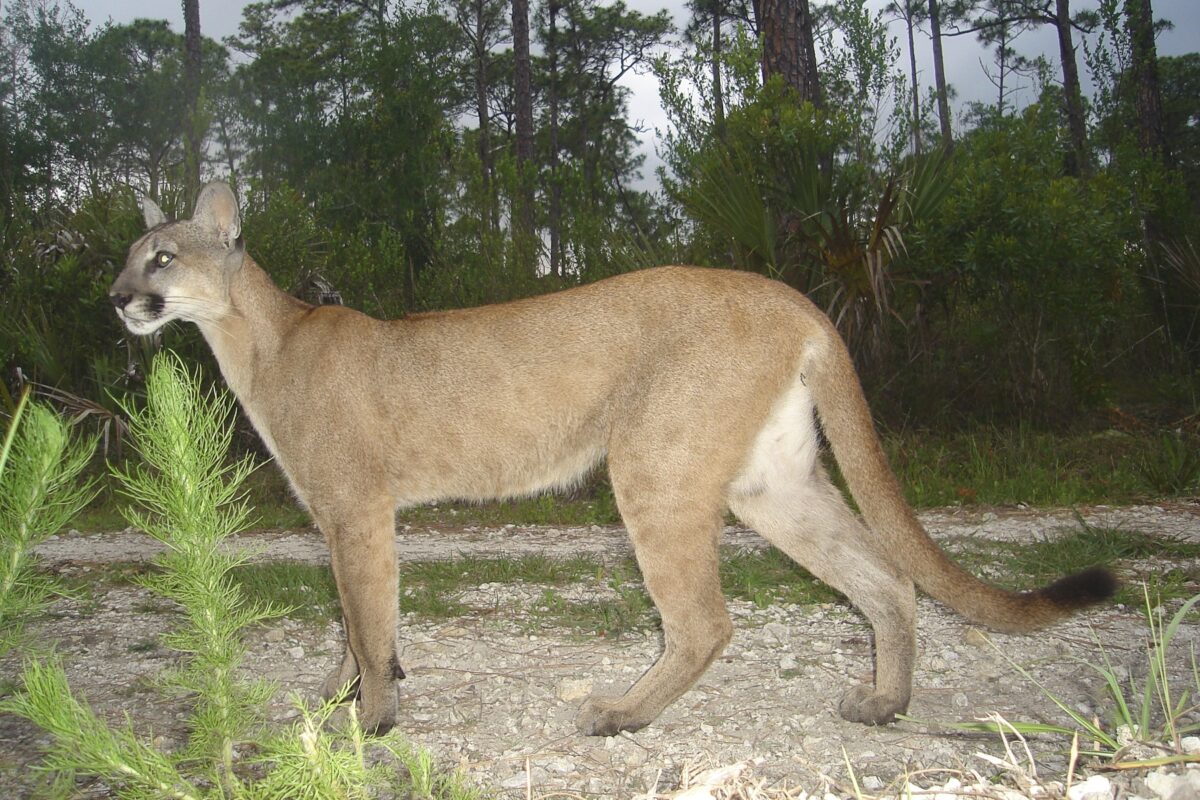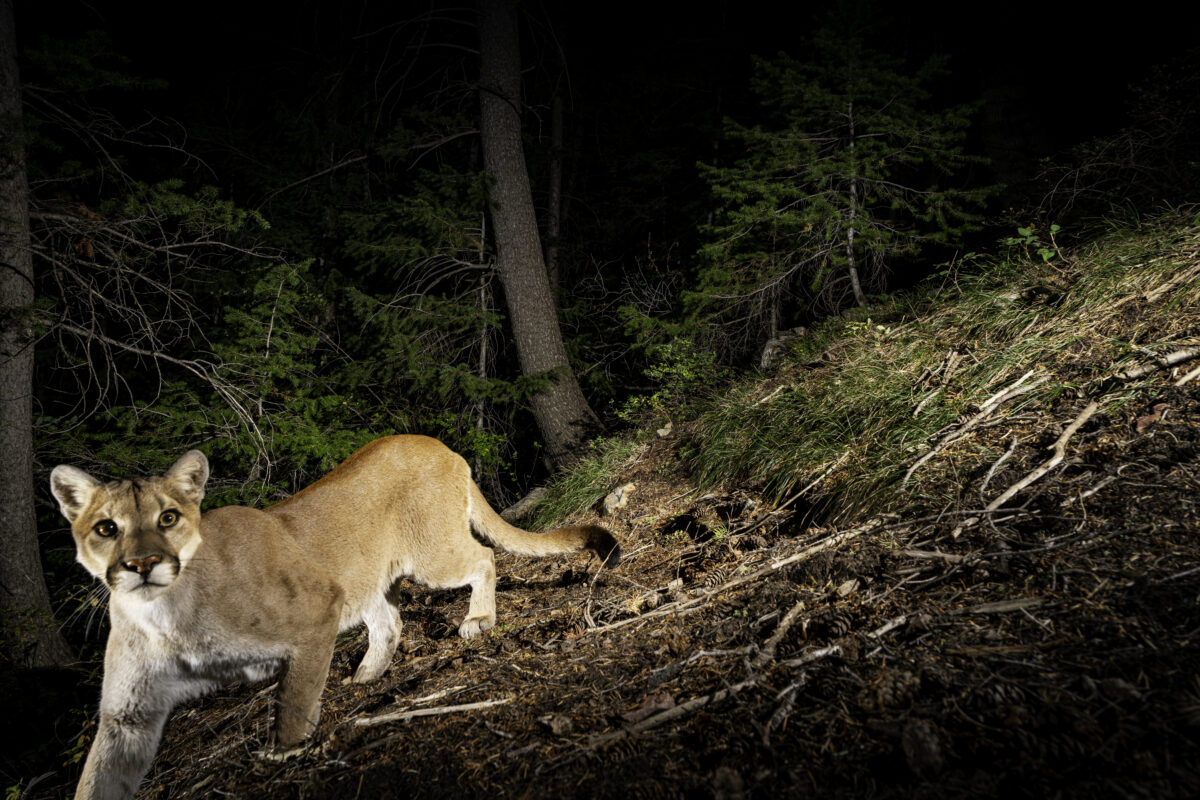Story by Paige Munson, Science and Policy Coordinator
Feature image by Denise Peterson and Explore Wild Media
Wild cats—specifically mountain lions, bobcats, and lynx—are the heart of a Colorado voter-led initiative (currently known as Proposition 91), that would ban the trophy hunting of mountain lions and the fur trapping of bobcats in the state. These cats have been historically maligned, bountied, and dismissed as dispensable actors in the Colorado ecosystem. Still today, mountain lions are sport hunted by the hundreds each year, and an unlimited number of bobcats are trapped for their spotted pelts. The demand for these pelts is especially high, as they are one of the only spotted cat pelts that are legal to sell in the fur market.
The passing of the ballot measure to protect wild cats in Colorado would usher in a new era of protections for feline carnivores in the state. Here’s what the measure (to be given a formal proposition number in September by the state) would mean for wild cats, livestock owners, hunters, Colorado Parks and Wildlife (CPW), and neighboring states.
What passing the measure would mean for cats
At an individual level, Colorado’s wild cats will be protected from hunting. Individual kittens will be less likely to have their mothers killed by hunters and therefore will have a far greater likelihood of living a longer life. From the wildlife management perspective, individual cougars are not the main consideration – cougar populations are.
Mountain lions did not evolve as heavily hunted animals. Kittens, or the sick, may be vulnerable to predation; but overall, being killed and eaten is not a part of the cougar’s evolutionary history. For this reason, when people hunt mountain lions, the death toll is a lot higher than populations would normally experience. This high amount of mortality can erode social stability, age structures, sex ratios, and is linked with increased conflicts with people. By eliminating this additional human caused-mortality, cougar mortality levels will be lower across the population, mountain lion social systems will be more stable, the population will have older individuals, and there will be a more even ratio between males and females.
The measure would dramatically decrease human-caused deaths for mountain lions. Human-caused death would still likely to be the number one cause of death for mountain lions in Colorado, as it is in most regions, even those that ban mountain lion hunting. Most of these deaths come from vehicle collisions, depredation kills, public safety kills, and poaching. Banning mountain lion hunting won’t solve all the human-created problems that cougars face, but it will have an incredible impact, nonetheless.
Some people claim that without hunting mountain lions, they will overpopulate, decimate deer herds, and lose their fear of people. Every piece of evidence we have indicates that habitat, prey availability, and mountain lion social structure, limits lion populations. Lions require no levels of hunting; remember, as apex carnivores, cougars didn’t evolve to be hunted. On the other hand, deer did evolve as a hunted species, with predators including humans, mountain lions, wolves, and other now-extinct species. This long evolutionary history makes deer populations not only tolerant to predation from mountain lions, but also dependent on that predation to prevent overpopulation. Mountain lion attacks do not increase in the absence of hunting, and multiple research projects have correlated more hunting with more human-lion conflicts.
A look to California
Aside from ecological theory, we can also look to California, the only American state that has banned mountain lion hunting. (In Florida, the ESA protects the small population of Florida panthers.) California Governor Ronald Reagan signed a mountain lion hunting moratorium in 1972, and citizens officially banned lion hunting in 1990. For 50 years, we have seen the effects of not hunting mountain lions. Cougars have not overpopulated. Moreover, due to habitat fragmentation, southern California lions are imperiled enough to be under endangered species consideration. Deer have persisted with mountain lion predation, a changing climate, habitat loss, and human hunting. There is no sign that deer populations are in danger due to mountain lion populations that are not “managed” through hunting.
Mountain lions in California are most certainly still impacted by humans, altering much of their behavior to avoid us. The idea that hunting mountain lions could teach them to fear us is also a myth. A dead mountain lion will not be able to tell the living that they should be afraid of humans. Mountain lions learn to fear humans from adverse experiences with humans and from their mother’s adverse experiences with humans. One study quantified this effect by comparing the rates of mountain lion attacks on people, depredation rates, and deer populations. All found that California either had the same levels or less than other states that allowed mountain lion hunting.
What passing the measure would mean for livestock owners
Mountain lions rarely prey upon domestic livestock and pets. When they do, it is typically small hoof stock, sheep or goats, and domestic dogs. They rarely prey upon cattle and if they do, it is generally a calf. However, even that is rare because the threat of other adult cattle typically deters this predation. While this type of predation is rare, investigators often misidentify a mountain lion as the offender.
Hunting mountain lions recreationally has never been a good means for reducing depredations. Recreational hunting does not target mountain lions that prey on livestock. To use an analogy, it is like imprisoning fifty random people and expecting crime to decrease. Mounting research has also correlated increased hunting and killing of lions with increased depredation events in subsequent years. Current evidence supports using nonlethal methods such as deterrents to prevent depredations, as opposed to killing carnivores.
While research does not support mountain lion hunting to reduce conflict, wildlife agencies often do not dispel the myth. Moreover, state agencies tend to hunt more cats in response to concerns from livestock owners. There is a full circle effect whereby the false belief that hunting will help reduce conflicts is reinforced. If Prop 91 passes, livestock owners can expect to see the same levels of conflict with wildlife and possibly even a reduction.
What passing the measure would mean for hunters
Most hunters are not interested in hunting mountain lions and prefer species such as deer or turkey. Hunting mountain lions is also one of the forms of hunting the public least approves of, right up there with the unpopular hunting of elephants and African lions. With mounting scientific evidence that recreational hunting of mountain lions is ecologically harmful, many hunters oppose the practice and support the ballot measure. For the minority of hunters who hunt mountain lions, the impacts of Prop 91 will be a loss. Some people, most from outside Colorado, pay a guide thousands of dollars to kill a mountain lion. These outfitters will experience financial loss, and their customers will not get the experience they were willing to pay for.
Some hunting groups feel that the measure is an attack on hunting writ large instead of a targeted attempt to conserve wild cats (and all wildlife that depend on a stable ecosystem with healthy and genetically-diverse populations of apex carnivores). These hunters are under the false impression that the passing of Prop 91 means that other forms of recreational hunting such as deer hunting will be threatened next. Unfortunately, many wildlife agencies fail to dispel this misinformation in the hunting community. A look at California should dispel this myth.
What passing the measure would mean for Colorado Parks and Wildlife
Currently Colorado Parks and Wildlife (CPW) is responsible for managing mountain lion populations through regulated hunting. Historically, they have approached management of mountain lions by aiming to repress the population. CPW is working to move management away from population repression to lowering hunting levels with hopes of maintaining stable populations.
CPW currently charges sixty dollars for residents to hunt mountain lions and 500 dollars for non-residents to hunt mountain lions, with an average of 2,500 licenses sold every year. If Proposition 91 passes, that would mean the loss of hundreds of thousands of dollars in licensing fees for the state. However, funds will also be saved as staff will not have to manage mountain lion hunting.
Recreational hunting of mountain lions is neither management nor conservation, it is a recreational activity. There are rare cases such as with imperiled bighorn sheep herds where removing mountain lions from the area might help the herd survive. This legislation would still allow for such activities.
CPW staff will continue to respond to depredation instances, issue depredation permits, and hopefully engage in mountain lion research to monitor the population.
What passing the measure would mean for neighboring states
A tag for hunting a mountain lion is generally cheap in most states, but outfitters can charge thousands of dollars to guide someone on a hunt to kill a mountain lion. Outfitters in Colorado will no longer be able to offer these guided hunts, and their customers will no longer be able to hunt mountain lions. As a result, these customers may look to neighboring states for an opportunity to hunt mountain lions. This may lead to states that don’t normally fill their quotas, doing so and increasing the demand for mountain lion hunting. As a result, managers may meet this demand by raising quotas for lions.
Colorado has been hunting at high enough levels that much of the cougar population is likely a “sink” population, meaning that it relies on immigration from nearby populations with low levels of mortality to maintain the population. If Colorado prohibits mountain lion hunting, it may become a “source” population for neighboring states where populations are more heavily hunted. The measure may change the mountain lion hunting market in neighboring states and slightly alter the home origin of some of their cats, but neighboring states should not expect to see any negative ecological effects.
Big picture
Mountain lions are ecosystem engineers that help support their natural areas through promoting biodiversity, including even soil health. As we move forward in a world of declining biodiversity, habitat loss, and climate change, efforts such as the Colorado ballot measure to protect wild cats and conserve species in closer accordance with their role in the ecological system are a step in the right direction.



 Facebook
Facebook Twitter
Twitter Send Email
Send Email


